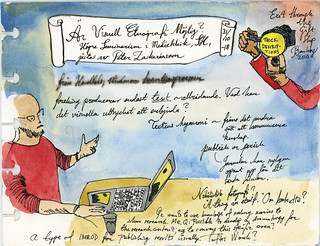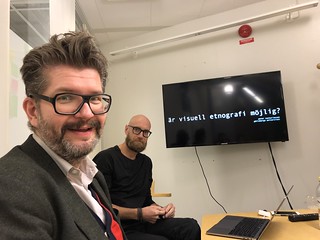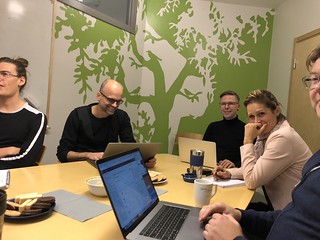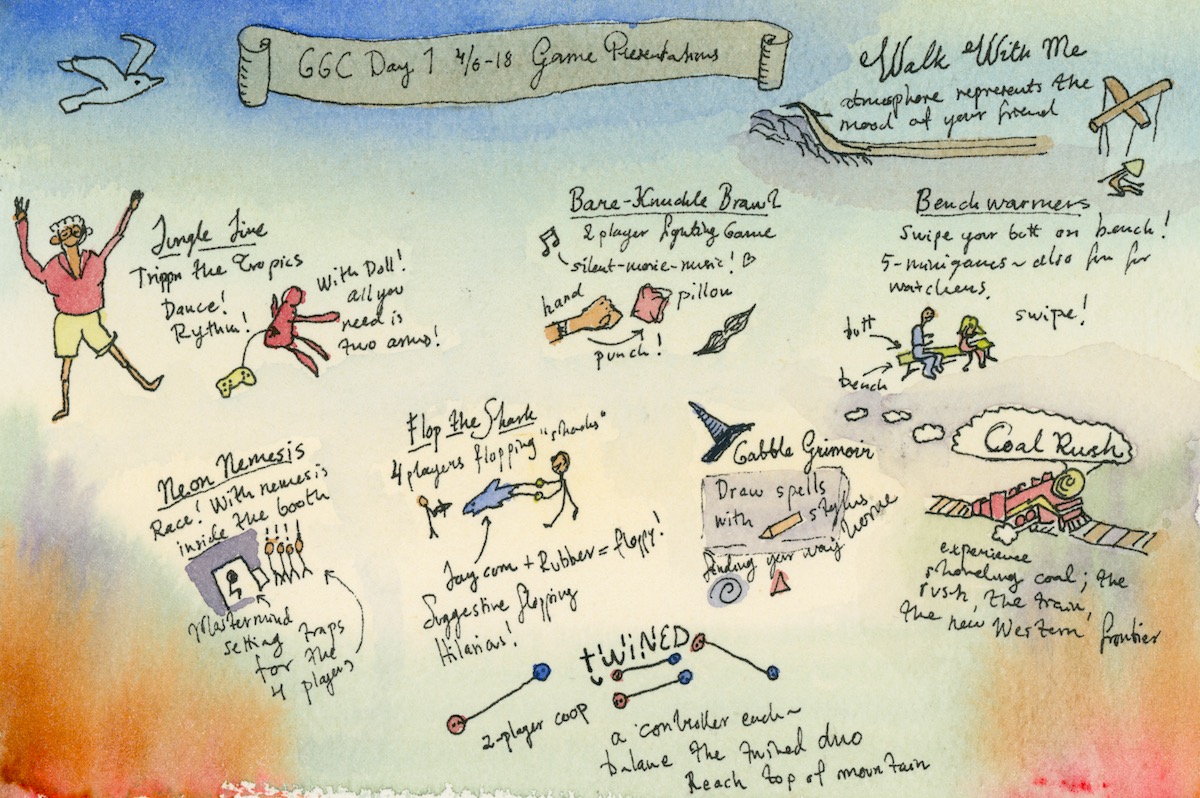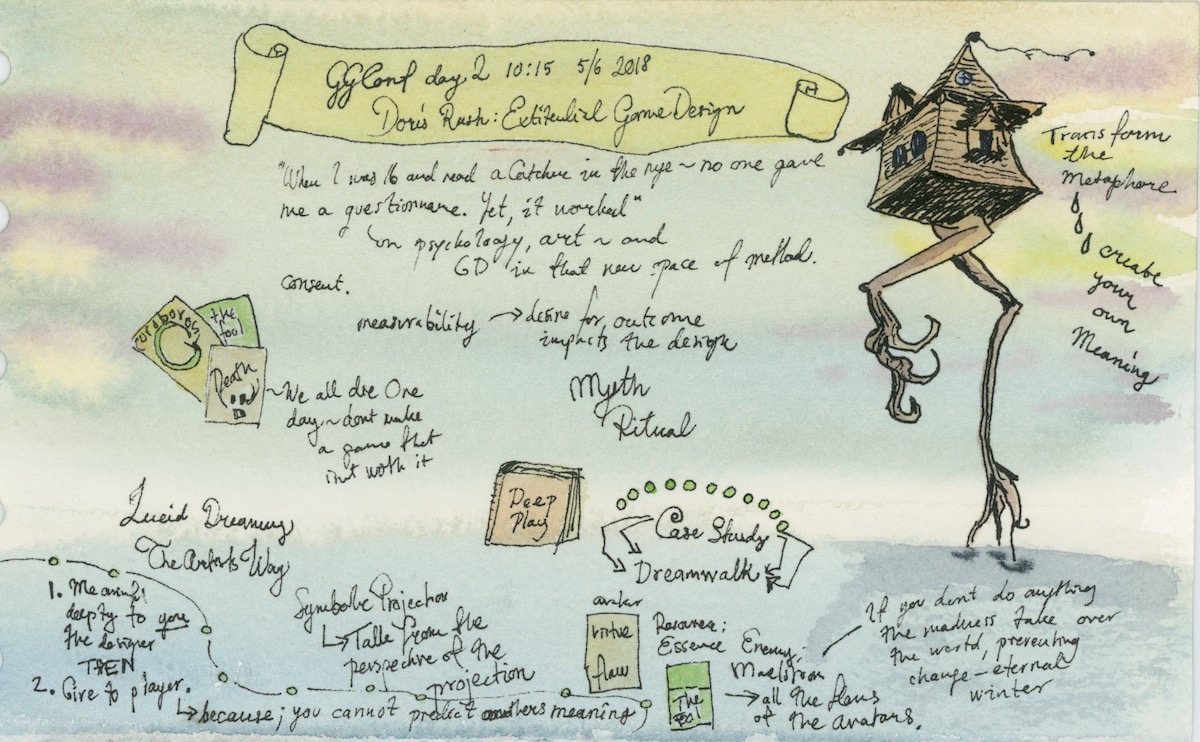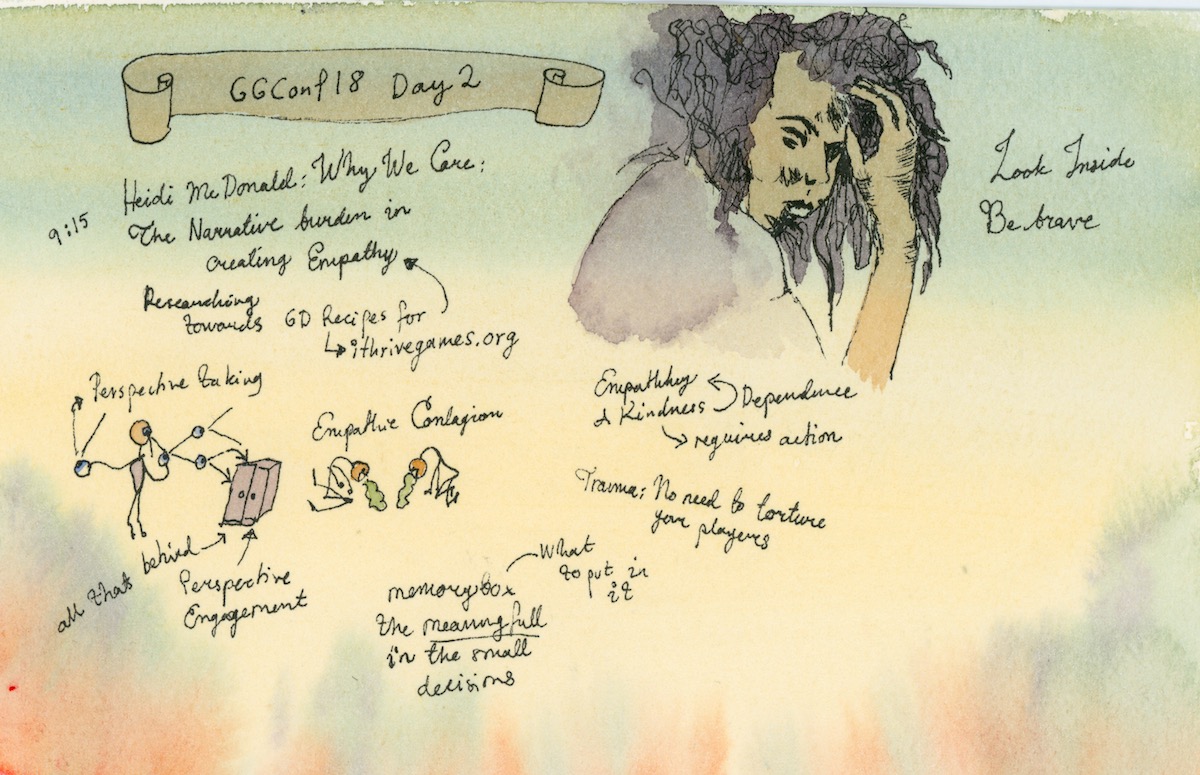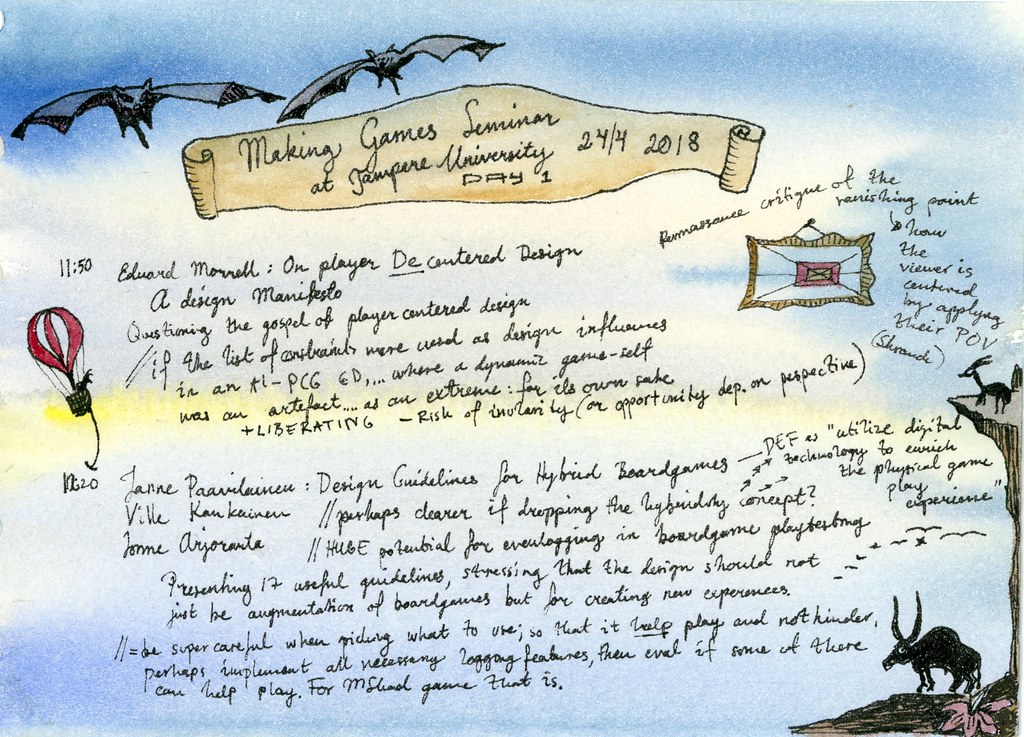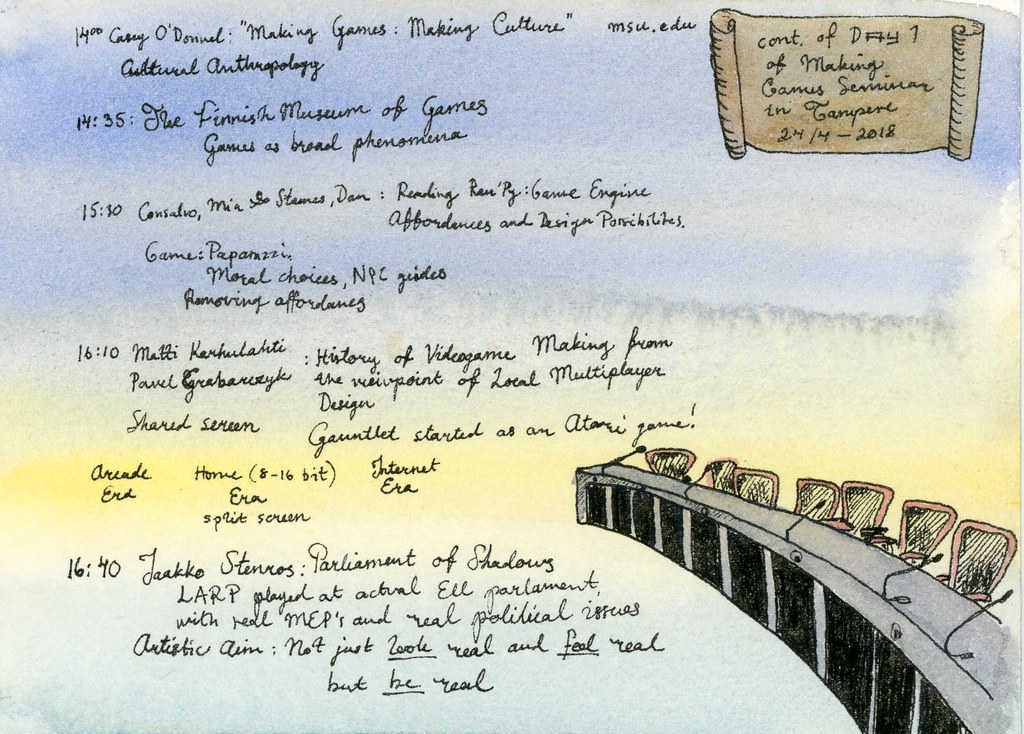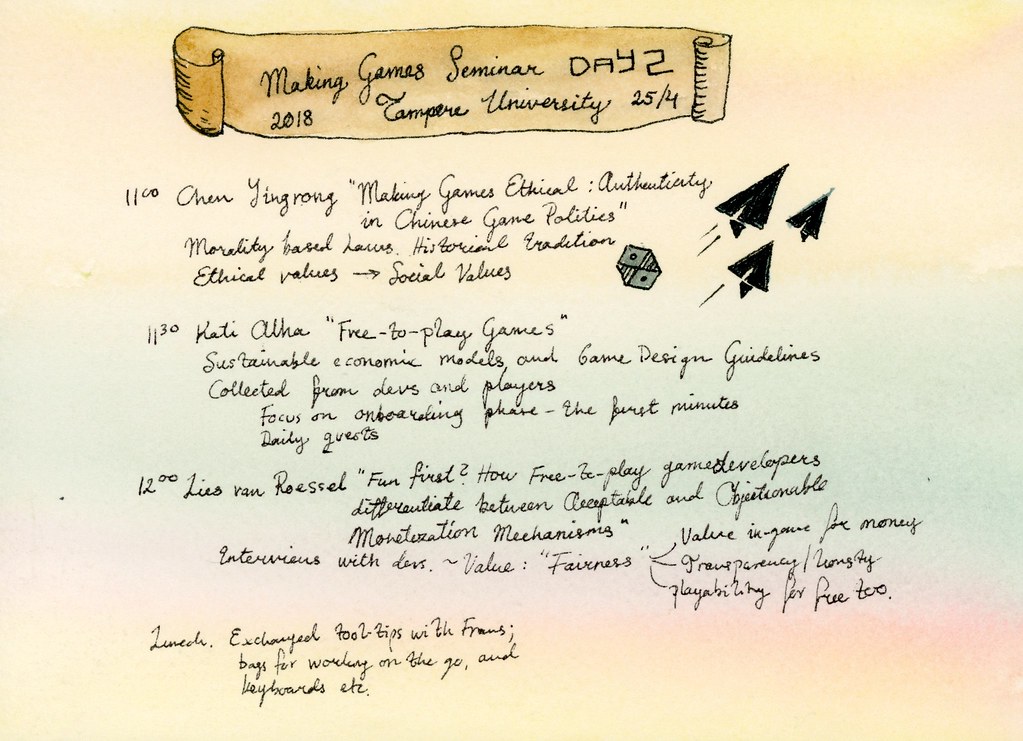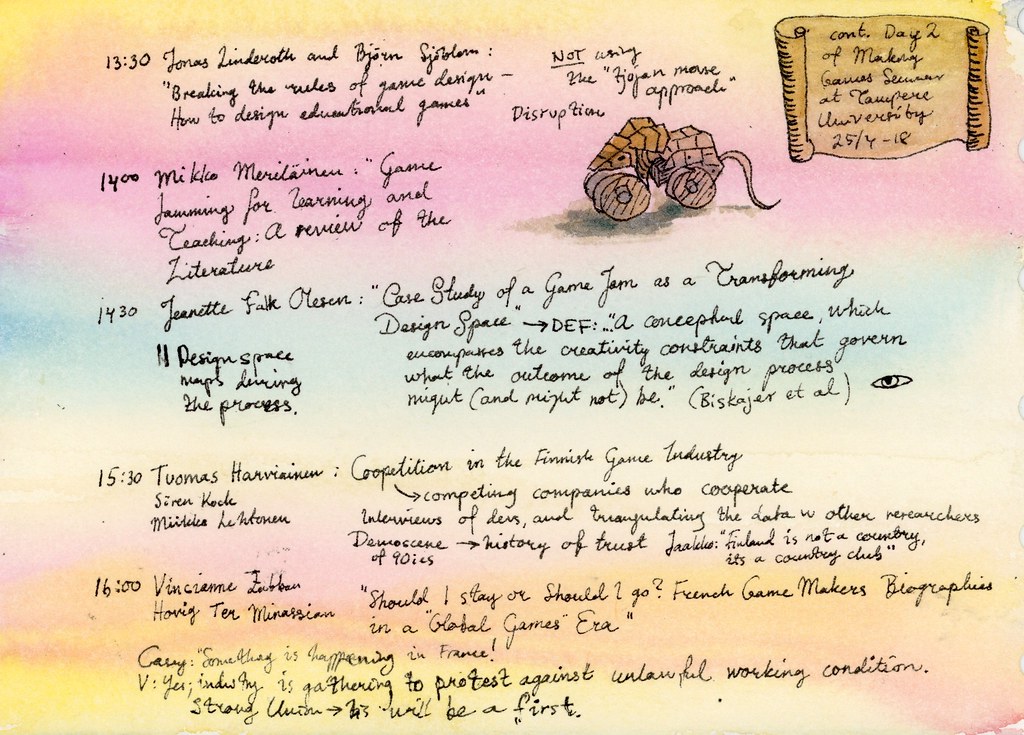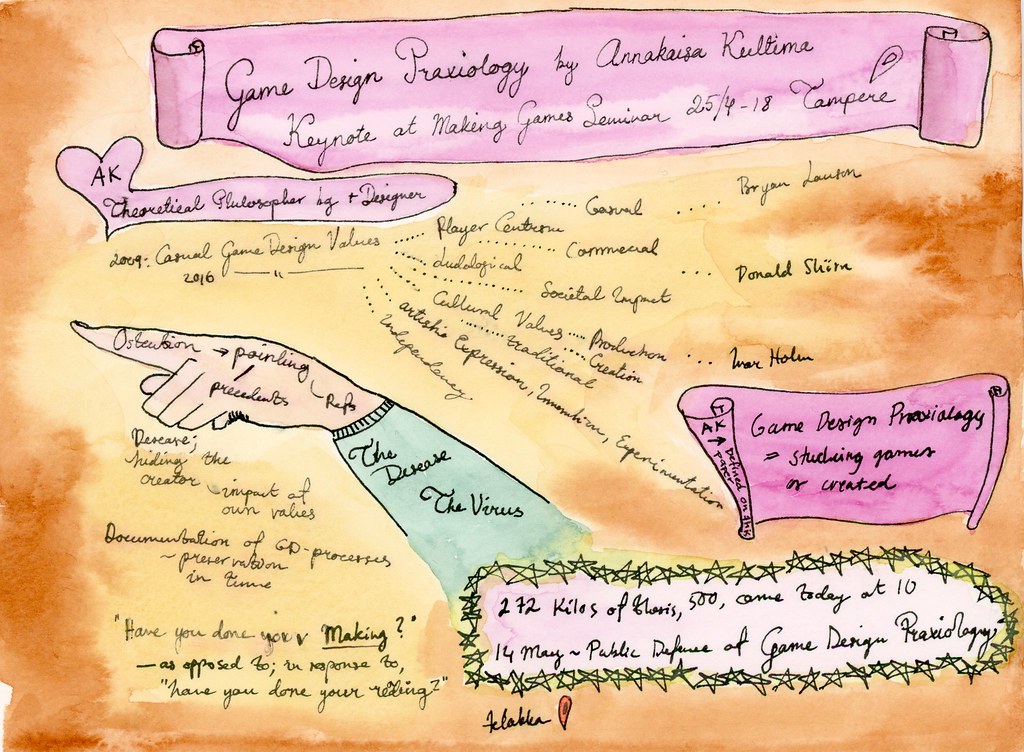Blog Archive
Monday, November 26, 2018
Changing Climates, Living Lab at Skövde University 23 – 25 November 2018
I attended an important and inspiring a symposium at the University of Skövde on November 23-24 focused on Environmental Humanities issues through interdisciplinary digital art and storytelling practices, invited by Lissa Holloway-Attaway. The symposium was funded by The Seed Box, a large Environmental Humanities consortium project centered at Linköping University, and it combines two sub-projects for which Lissa have received funding. One project is called “Enacting Baltic Eco-Systems” and is focused on exploring Baltic Sea ecologies and threatened environments, and the other is called "Digital Imaginaries/Posthuman Visions” and is more specifically focused on speculative climate change issues as imagined through digital/artistic interventions that might engage citizens and bring awareness. Lissa gathered a group of interdisciplinary scholars and artists to brainstorm both project themes and share current research or projects.
Before going, I brainstormed what of my previous work could be useful to share: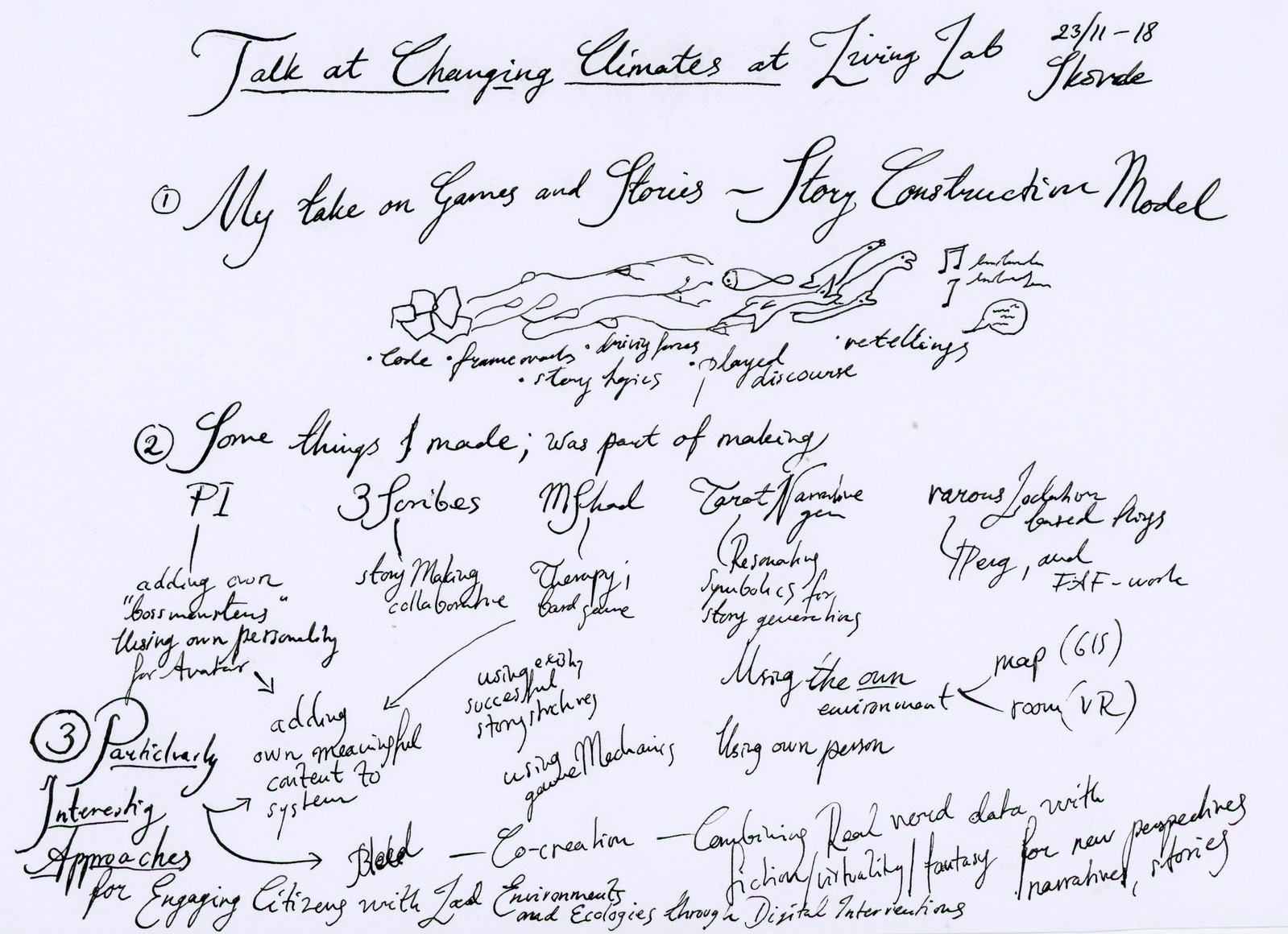
It was an interesting thought exercise, because it made me realize to what a large extent I have been concerned with notions of co-creation over the years. I drew a summary of how I see story construction happening in large narrative systems, and in it, I see the area that is the intersection between designed and played narrative potential to be a powerful point – when users/players are invited to add their own creation into already existing systems. (the area between the leaves and the fish)
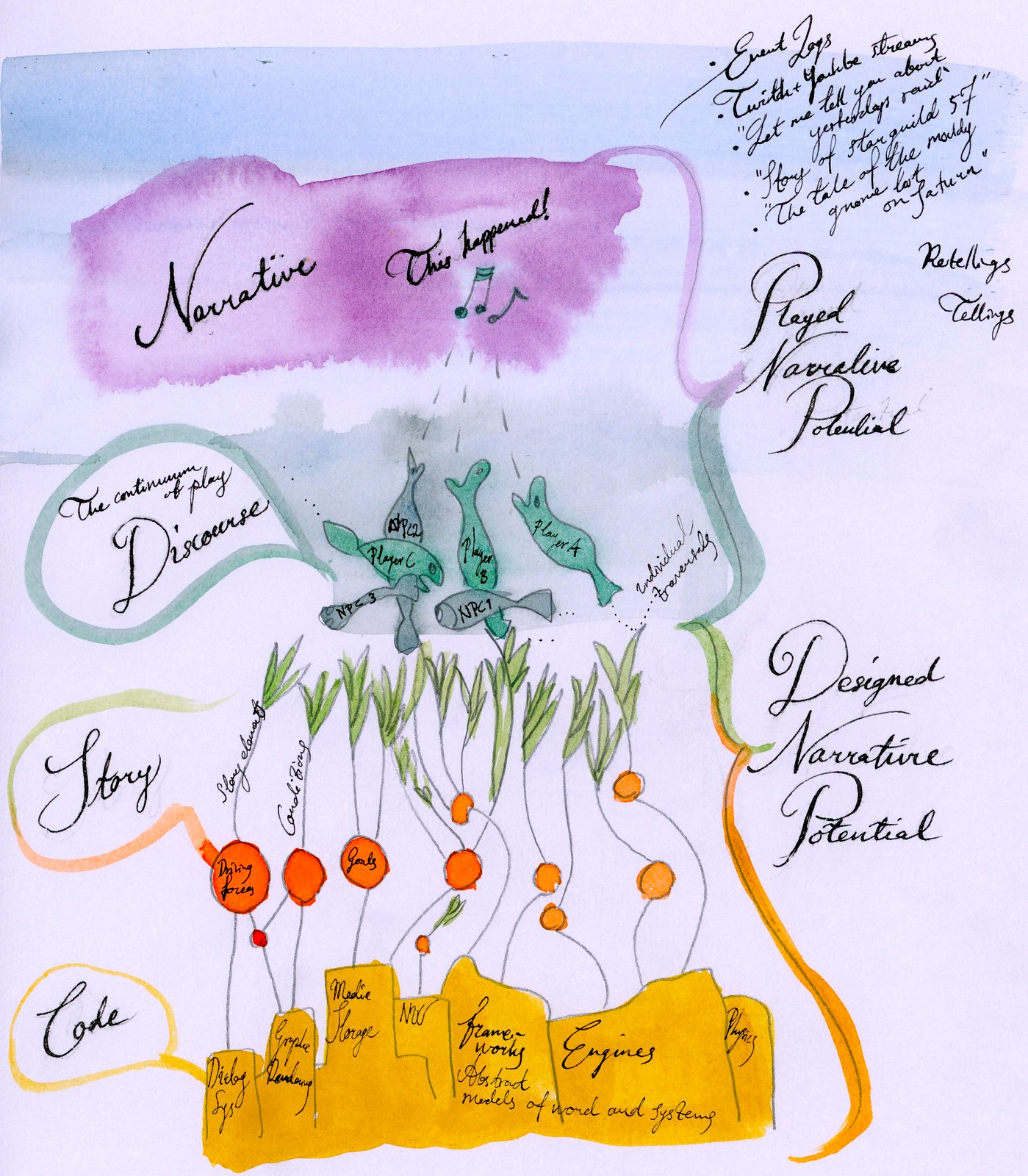
I made some notes during the day, here they are: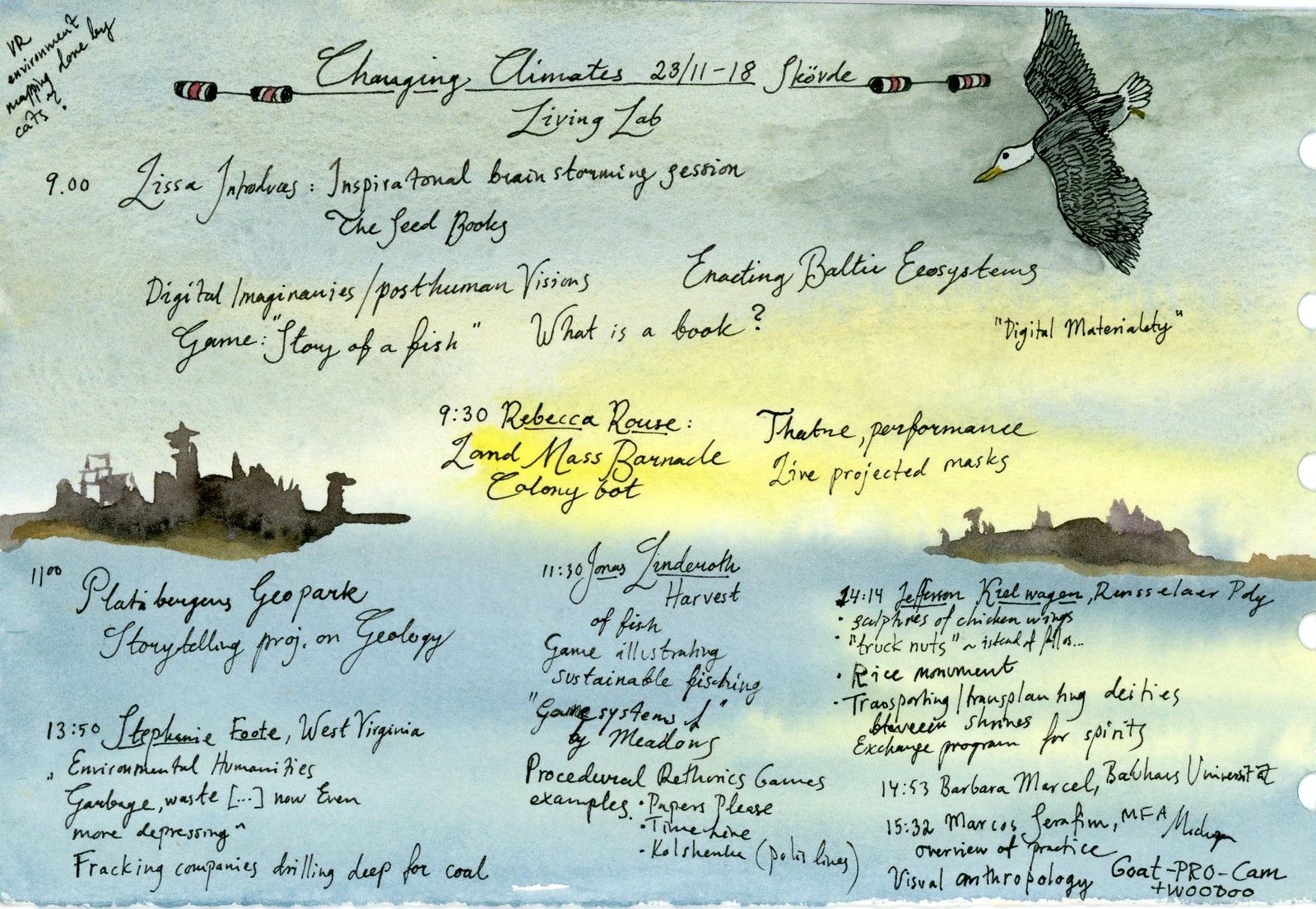
I’m so glad I was invited! It was wonderful to meet old friends, and to make new ones in context where we might be able to make some difference together.
Link to Seed Box
Some photos from the event at Flickr:
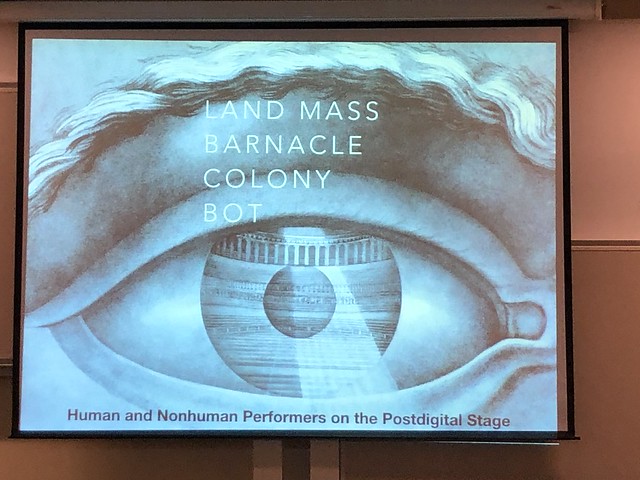
Before going, I brainstormed what of my previous work could be useful to share:

It was an interesting thought exercise, because it made me realize to what a large extent I have been concerned with notions of co-creation over the years. I drew a summary of how I see story construction happening in large narrative systems, and in it, I see the area that is the intersection between designed and played narrative potential to be a powerful point – when users/players are invited to add their own creation into already existing systems. (the area between the leaves and the fish)

I made some notes during the day, here they are:

I’m so glad I was invited! It was wonderful to meet old friends, and to make new ones in context where we might be able to make some difference together.
Link to Seed Box
Some photos from the event at Flickr:

Wednesday, October 31, 2018
Saturday, October 27, 2018
SGC18 Post Card
SwedenGame Conference (SGC18) in Skövde was packed with interesting talks - overall
great conference.
What
to me stood out most was the sense of community, warmth and inclusion. This
feeling struck me hard on the final official party when we were doing Marioke -
singing rewritten texts to well-known songs. Standing there together, singing
with one voice, - students, alumni, speakers, faculty, old friends -
it dawned upon me how far we have come. There is a context for people coming
into the industry that already *exists*, and it is a good one. I also that
this doesn't come for free. The faculty at Skövde University, especially my old
friend and colleague Jenny Brusk, has been working actively and relentlessly to
create this, by their daily practice and the work with DONNA.
I was so busy during the conference that I couldn't make my usual watercolour notes, but I made a little dabble as a thank-you postcard the other morning. It is just a quick sketch from a photo I took at the party, and a some lines I remember we sang (David Bowie's Life on Mars). Here:
What I did at the conference was mostly to talk about HEVGA (Higher Education in Video Games Alliance) work we can work on in Europe with anyone who was interested. Interested to engage in the HEVGA Europe work? Become member :). We posted a write-up of the conversations in the the Hevga Europe FB-group! .
I also gave a talk about my work in how to frame board game play situations as safe-spaces for personal problem-solving. The talk is up here.
I was so busy during the conference that I couldn't make my usual watercolour notes, but I made a little dabble as a thank-you postcard the other morning. It is just a quick sketch from a photo I took at the party, and a some lines I remember we sang (David Bowie's Life on Mars). Here:

What I did at the conference was mostly to talk about HEVGA (Higher Education in Video Games Alliance) work we can work on in Europe with anyone who was interested. Interested to engage in the HEVGA Europe work? Become member :). We posted a write-up of the conversations in the the Hevga Europe FB-group! .
I also gave a talk about my work in how to frame board game play situations as safe-spaces for personal problem-solving. The talk is up here.
Thursday, October 25, 2018
HEVGA @ Sweden Game Conference 2018
Summary by Björn Berg Marklund and Mirjam Palosaari Eladhari
During the Sweden Game Conference in Skövde in October 2018, HEVGA hosted 3 separate events: 1 roundtable, and 2 “Fika” events co-organized by the DONNA Café. (Roughly translated, Fika means sitting around talking over a cup of coffee.)
We were thrilled to see people showing up to an academic roundtable at the conference that caters fairly heavily to industry practitioners, and even more thrilled that we became a sizeable group. Participants brought valuable perspectives and topics of conversations to both the Fika events and the roundtable.
Most discussion happened during the roundtable, but a lot of useful and interesting topics of conversation were also brought up during the Fika and casual conversations on the conference floor. The roundtable was attended by about 15 participants. After a brief introductory presentation held by Mirjam (about the core function of HEVGA and the European initiative), we split the attendees into two groups to make discussions flow a bit smoother.
We’ve compiled a summary of the discussed topics for this post.
Key take-aways from discussions
A much needed resource: Knowledge Exchange:
A recurring topic of conversation during the whole conference was: there are barely any resources available to learn about other people's’ teaching experiences in game education. Lots of people have interesting solutions to issues we all face. From program establishment, course designs, industry partnerships, student contests, and play sessions, people are continuously doing great things in game education. These experiences and the knowledge of the people conducting these types of things rarely get spread around much and remain with the individual. Creating a good incitament for sharing these things would be a good boon to our community. We discussed many different options for such an incitament:
The organisation of a workshop on the topic of discussing teaching methods in higher education in games.
- Question: Potential conferences for locating the workshop? (DiGRA Tokyo, Nordic DiGRA, FDG, SGC, GGC, etc.)
- Question: Organisational team and program committee composition?
A side-note here, of course, is that one would need to think about which parts of teachings we feel are part of an educator’s “IP”. We rarely discuss teaching materials in that way in Europe, but it might be something worth considering in drawing up the framework of the publication.
An upcoming event for discussing teaching methods, especially geared towards transgressive methods, will be organized by Hartmut Koenitz and his colleagues at Nordic Digra in Bergen in 28-30 November 2018 (https://digranordic2018.w.uib.no/program/).
A recurring topic was the need to share model curricula, and referring to the white-paper that was created by IGDA back in 2004. We recognised the need to approach IGDA to investigate whether there is a SIG or other group who is already doing this, and explore possibilities for making it happen again, together.
A couple of much needed services:
1: HEVGA as an advocacy group. HEVGA has been a policy and advocacy voice in the United States and internationally through the World Health Organization, and its Value Statement on Diversity & Inclusion. Participants felt that there were struggles that all academics went through in their day-to-day work.
One recurring challenge we have is responding to industry pressure - which is difficult to do as an individual. We frequently struggle with understanding, or agreeing, on whether we are intended to be reactive, or proactive, in our relationship with the industry. As universities (i.e. vocational institutions), we both feel that we have a responsibility not to just mirror industry needs as that goes against our fundamental role in society, BUT we also feel an obligation towards our students who expect, and should, be able to use their degree as a springboard into the industry. The tension between these two wills/needs has decreased in later years, as industry continuously becomes more and more aware of the importance of flexible, adaptable, and critical ways of thinking (which academia excels is teaching people). Students and industry would often prefer us to adhere to market standards way closer, and while we certainly want to accommodate for these standards we don’t want to be beholden to them. What type of balance should we aim for, and how do we maintain it? Can HEVGA provide a venue for discussing this challenge in a broader network?
2: During discussions about education, one method that participants found useful in teaching students about the industry was to have them publicly publish their game creations somewhere after finished game project courses. This could either be on indie portals, steam, iOS, or anything else. One portal that was particularly useful for this was itch.io, and here in Sweden we rely pretty heavily on Sweden Game Awards (https://www.gameawards.se/) to get students to spread their games around. It might be useful to look into the possibility of providing a similar service through HEVGA - maybe an annual contest that students can send their games to, and a jury of HEVGA members (industry professionals and academics) that can give out awards.
A topic that needs more attention: Practices
One important point we kept discussing was the lack of courses that discuss development practices. Shortly summarized, the group felt that “we are good at teaching students to pick apart the form, but bad at teaching students to pick apart the practice”, which we consider to be one possible reason for toxic/unhealthy working climates persisting in the industry. We should teach students to better identify unhealthy power dynamics, or discriminatory practices (which can certainly express themselves in indirect and “soft” ways). This, of course, bleeds into the other topics we’ve discussed - maybe it could be part of a published anthology.
Another practice that needs attention is that of developing language and practices that can be used when critiquing games as cultural artifacts.
Further development of postgraduate education
This discussion was, because of the affiliations of the attendees, mostly geared towards postgraduate education in Sweden. We discussed the possibility of applying for funds from the Swedish KK foundation in order to finance PhD candidate work in cooperation with industry. We also touched upon the need of, in the future, create a national research school focussed on game studies.
Further, the plans for a summer school that were initiated at the HEVGA Symposia on Gotland in June 2018 were solidified. The tentative plan is that the first summer school will take place in Skövde in August 2019, and that Patrick Prax and Henrik Warpefeldt continues to pursue the organization of the endeavour. Tentatively, the plan was that the summer school would rotate between locations, but we also saw that it could be a benefit to have it at a regular place, akin to the summer school in Utrecht. We discussed that it would be interesting to have different overarching themes for the different years for the summer school, akin to how the Tampere Spring seminar operates. That way, those who help out as supervisors and lecturers can converge around topics that are timely, or of common interest.
ERASMUS
The discussion about utilizing the Erasmus structure that was initiated at the Symposium on Gotland in June was continued: we recognized the need of having mapping of what courses that students can go in exchanges. We also recognized that the teacher exchange program would be useful for us as educators in order to gain broader perspectives and inspiration.
A potential opportunity is the ERASMUS Plus master program - a way to build an international modular education. An interesting practical model for working internationally would be to learn from the project Global Game Classroom - a setup where two classrooms see projections of each other, in this case between Skövde and Worcester Polytechnic Institute. Using such technical aids may be practical for creating an international program where teachers and students can work together without having to relocate.
A potential opportunity is the ERASMUS Plus master program - a way to build an international modular education. An interesting practical model for working internationally would be to learn from the project Global Game Classroom - a setup where two classrooms see projections of each other, in this case between Skövde and Worcester Polytechnic Institute. Using such technical aids may be practical for creating an international program where teachers and students can work together without having to relocate.
Organisers: Björn Berg Marklund, University of Skövde Mirjam Palosaari Eladhari, Södertörn University and HEVGA and Jonathan Elmergreen, HEVGA
Participants: Christie Dena - Independent, Universe Creation 101 (Australia), Fernando Bevilacqua, University of Skövde & University of Chapeco (Brazil), Stefan Jonsson, University of Umeå, Arctic Game Lab, Hartmut Koenitz - HKU University of the Arts Utrecht, Josefin Westborg - Lajvversktaden & Chalmers University, Patrick Prax - Uppsala University, Jenny Brusk - University of Skövde, Per Backlund, University of Skövde, Håkan Vallin, Luleå Tekniska Universitet, Martin Hagvall, University of Skövde, Anastasiia Tokarieva, University of Skövde, and Lissa Holloway-Attaway, University of Skövde
Wednesday, October 03, 2018
Jenny Brusk: Inclusive Transmedia Storytelling
Jenny Brusk was invited to our higher seminar at the Media Technology Department at Södertörn University and gave a excellent talk: "Marvinter: A Casestudy of an Inclusive Transmedia Storytelling Production".
Especially interesting was how the authors needed to work with the different affordances for the different modalities of the narrative; to use either only images, or only sound, but still make it natural for players/readers/listeners who can both hear and see. Impressive!
Here are my notes. (I took notes on watercolour backgrounds I had made when the department was away at a seminar a few weeks before, hence the conflicting dates in the images.)
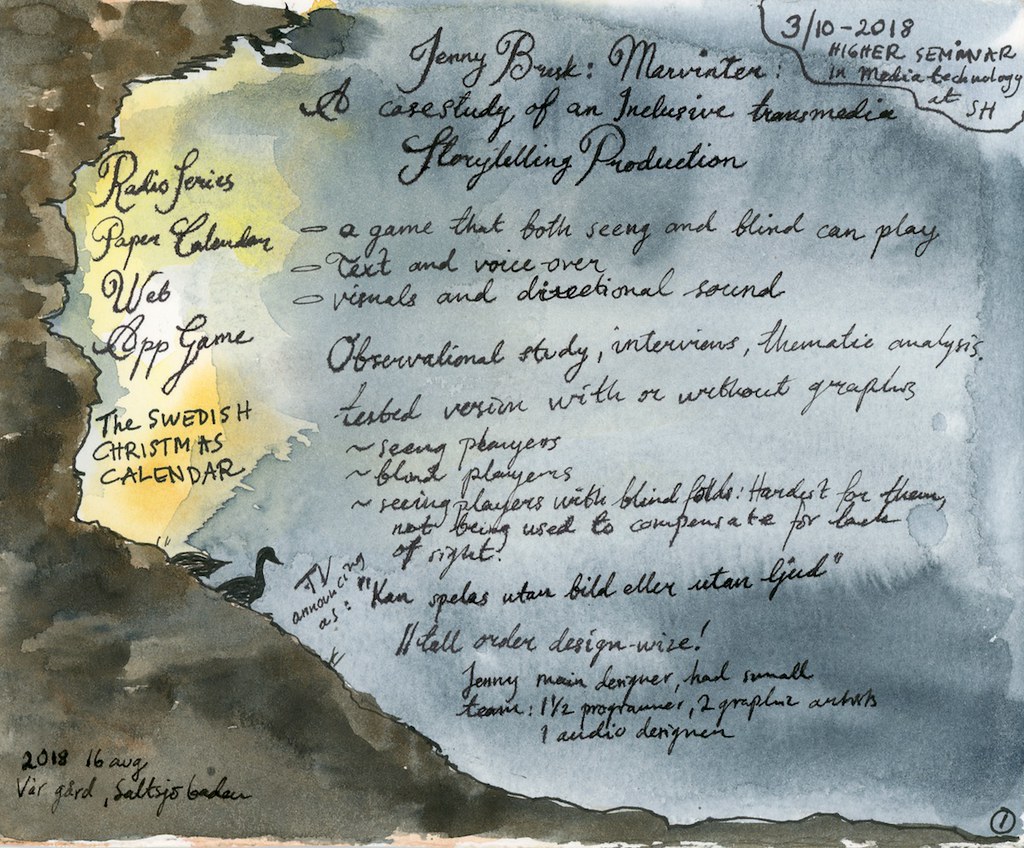
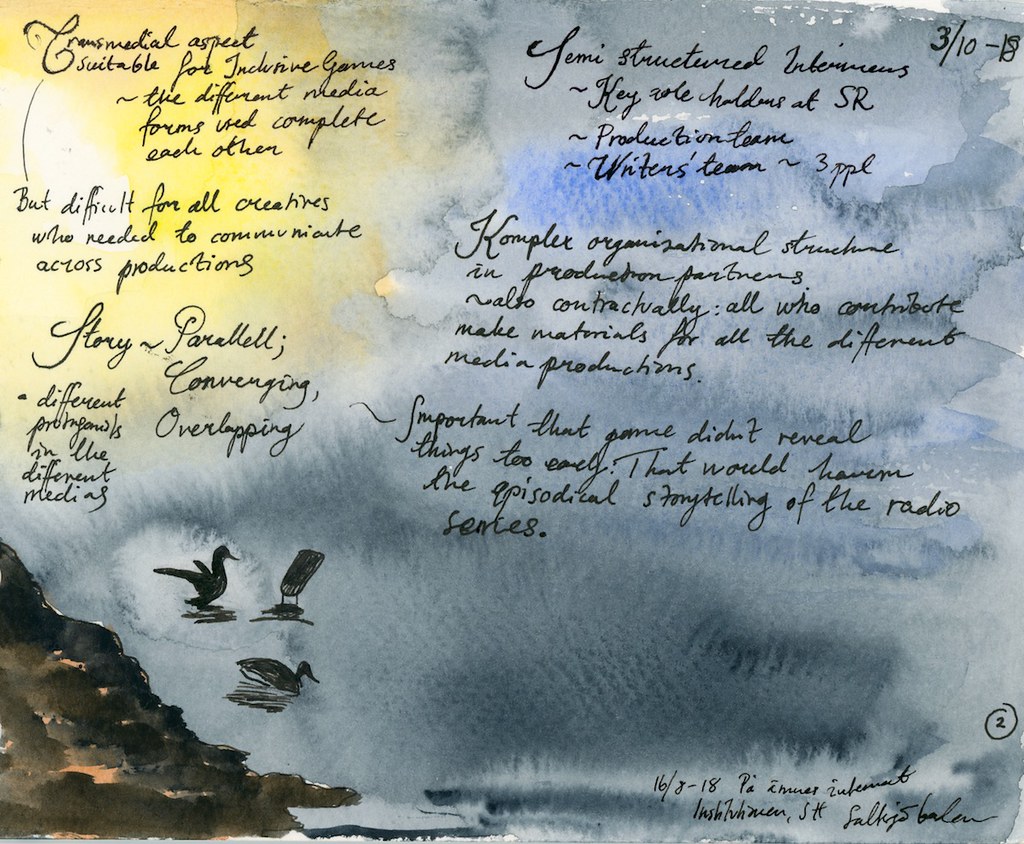
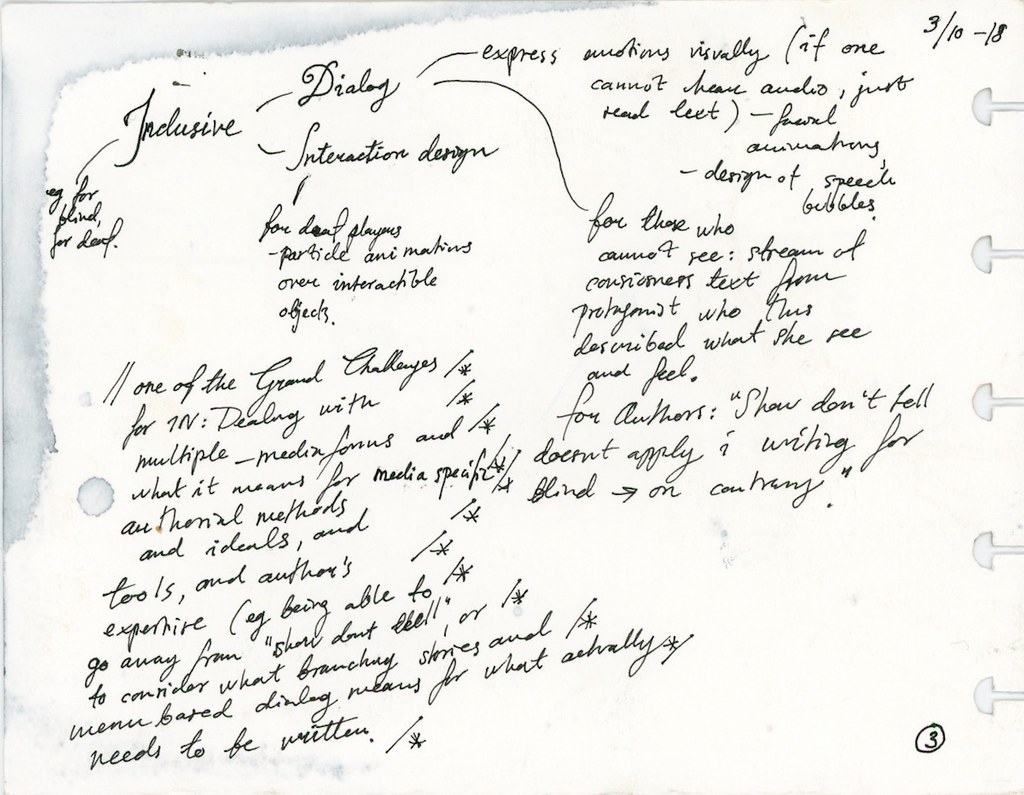
Especially interesting was how the authors needed to work with the different affordances for the different modalities of the narrative; to use either only images, or only sound, but still make it natural for players/readers/listeners who can both hear and see. Impressive!
Here are my notes. (I took notes on watercolour backgrounds I had made when the department was away at a seminar a few weeks before, hence the conflicting dates in the images.)



Friday, August 10, 2018
FDG 2018 in Malmö
The Foundations of Digital Games Conference 2018 (FDG 2018) happened in Malmö, so it was great fun to introduce friends to Sweden. Some of them I dragged with me back to Stockholm so we could hang out some more :).
Anne Sullivan presented our paper "Tarot Based Narrative Generation" at the PCG Workshop that we wrote jointly with Mike Cook.
On the thursday I was part of panel " Methods, History, and Impact - Directions in Game Design Research" together with Hartmut Koenitz, Elisa Mekler, Christian Roth, Staffan Björk, Petri Lankoski, Annakaisa Kultima, and Christopher Schmitz. It is not in the FDG proceedings, but we rewrote the panel text afterwards, informed by the discussions. That text will at CHI PLAY 2018 GER-18 Workshop.
Here are the watercolour notes I made:
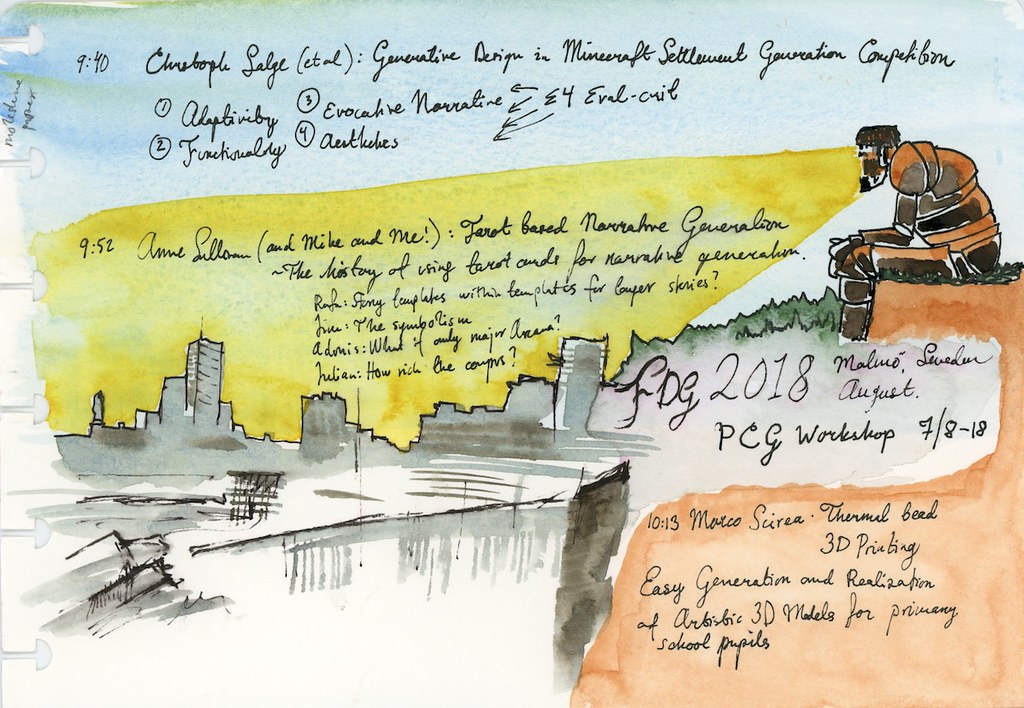
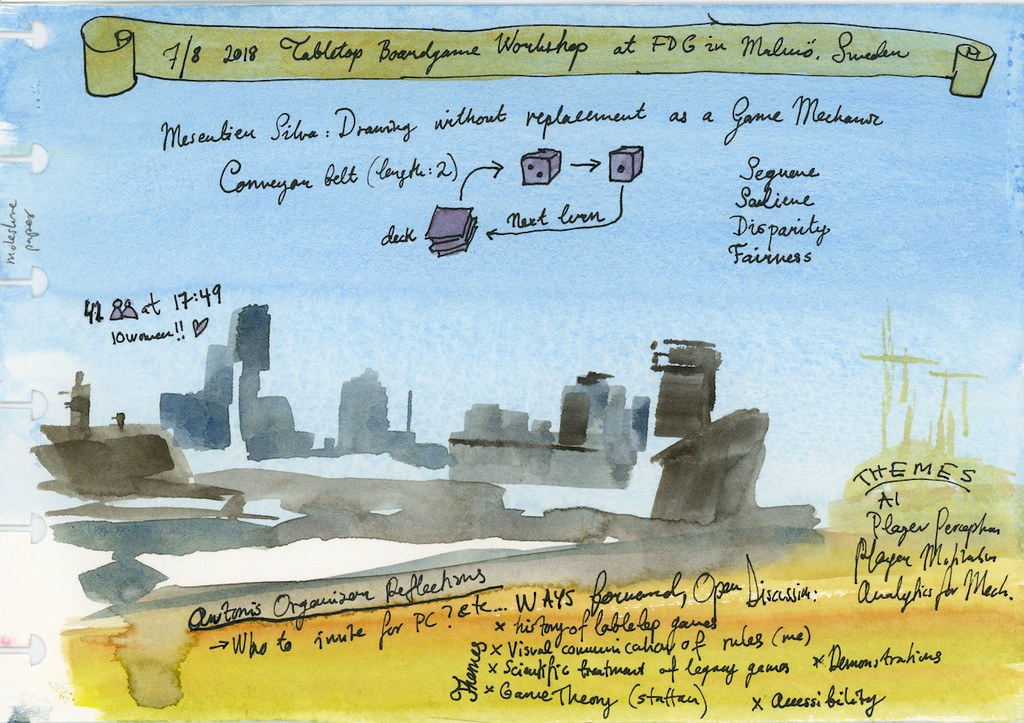
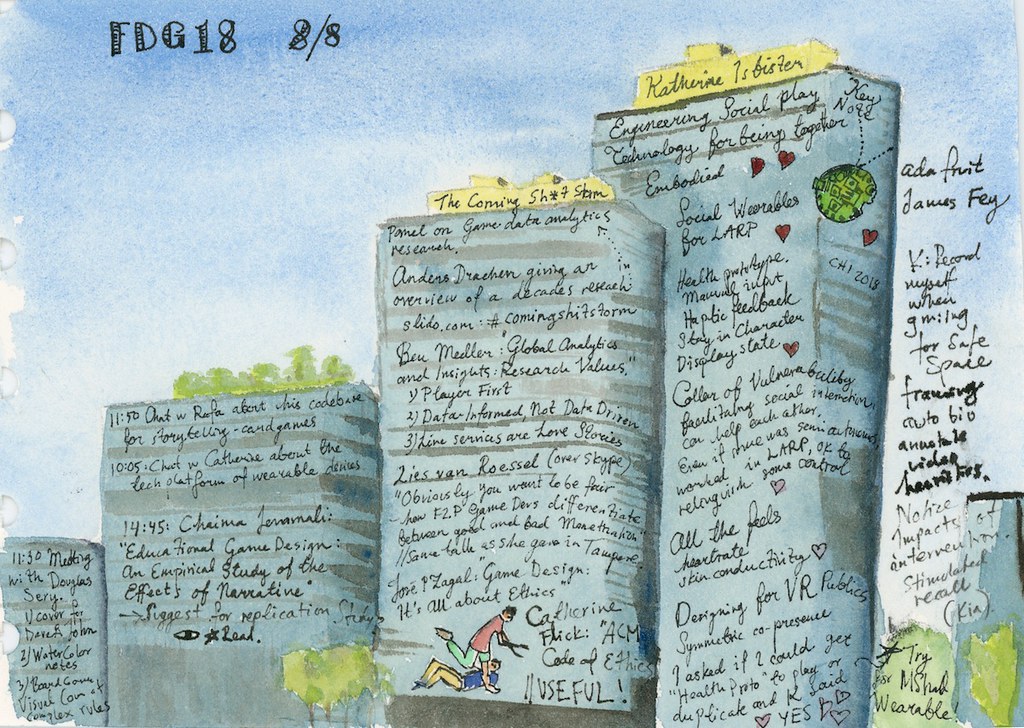
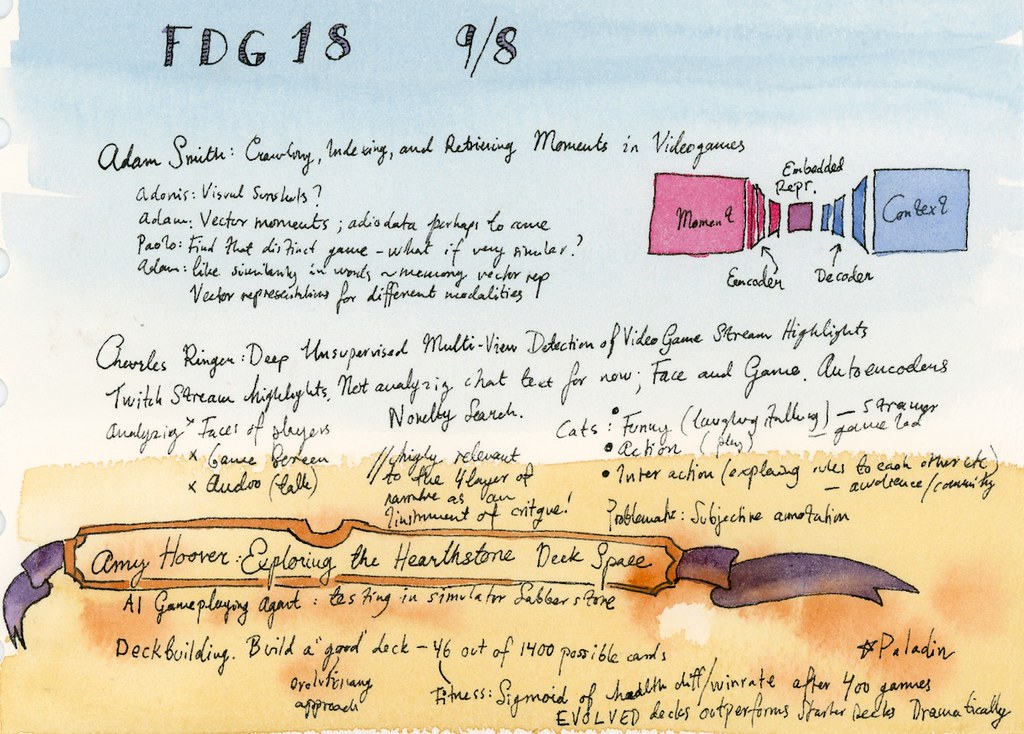
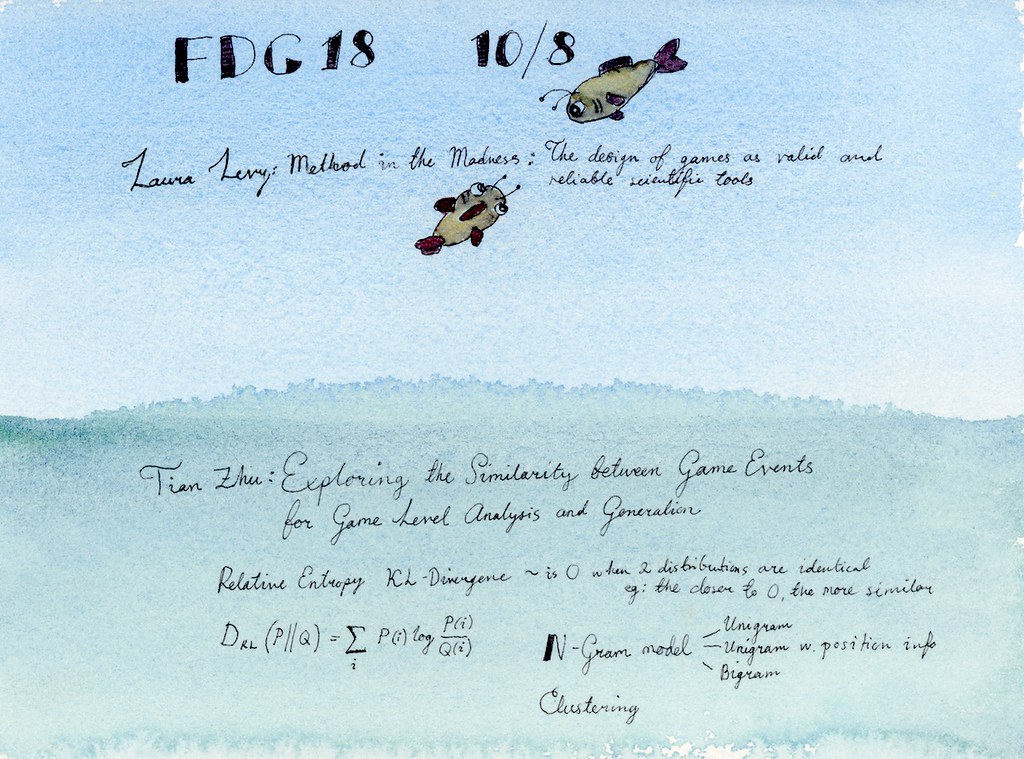
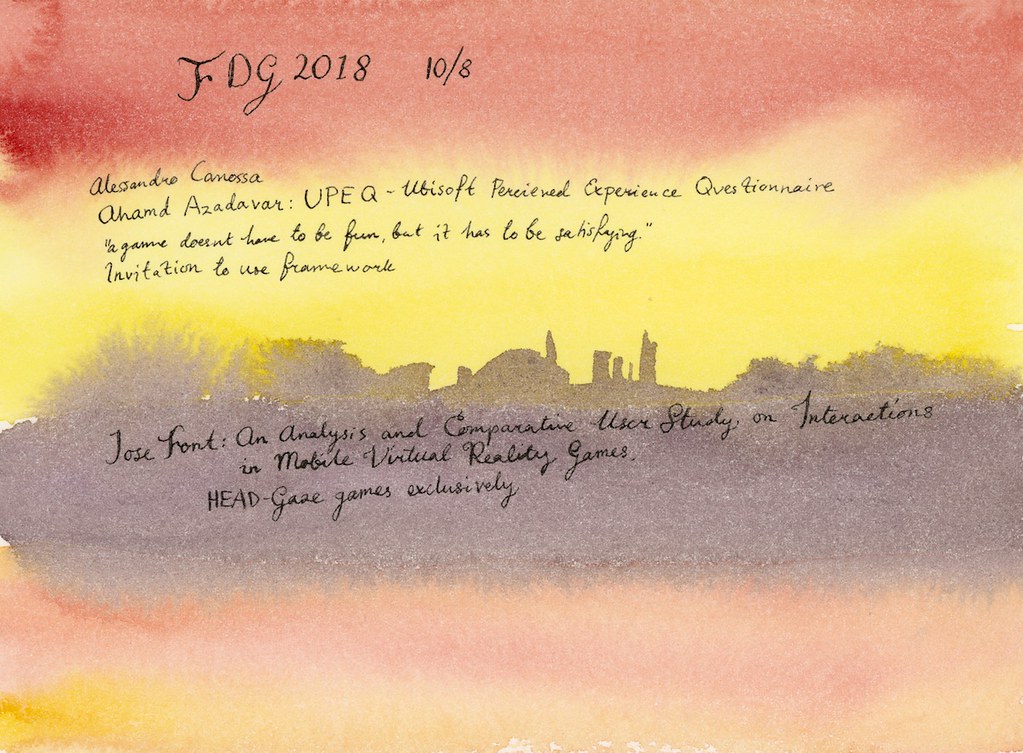
Anne Sullivan presented our paper "Tarot Based Narrative Generation" at the PCG Workshop that we wrote jointly with Mike Cook.
On the thursday I was part of panel " Methods, History, and Impact - Directions in Game Design Research" together with Hartmut Koenitz, Elisa Mekler, Christian Roth, Staffan Björk, Petri Lankoski, Annakaisa Kultima, and Christopher Schmitz. It is not in the FDG proceedings, but we rewrote the panel text afterwards, informed by the discussions. That text will at CHI PLAY 2018 GER-18 Workshop.
Here are the watercolour notes I made:






Saturday, July 28, 2018
HEVGA @ GGC18
2 Day Symposium: HEVGA European Symposium at Gotland Game Conference 2018, 5-6 June, Gotland, Sweden
Here’s a quick write-up on the HEVGA Symposium we had a few weeks ago in Visby!
We were around thirty game scholars who gathered in Visby, in junction to the Gotland Game Conference, to discuss higher education in Video Games during a two day symposium arranged by the fabulous Ulf Benjaminsson and Adam Mayes. The first day was dedicated to talks on the topic. During that first day, we had plenty of time for discussion in breaks and at meals, so that we, on the second day, could form workgroups.
The overarching aim of the second day was to explore what we as a group would find most important to gather around for advancing the state of higher education: how can we support each other in the long run, and what can we start doing right now? Jonathan Elmergreen and I had prepared some topics, but encouraged to have breakout-groups so that as many voices as possible would be heard. Each group got a small template to use for notes, so that we in retrospect easily can summarise the main outcomes of the discussions.
We had four work groups:
- ERASMUS exchanges, led by Jonathan Elmergreen and Alvin Sullivan
- Industry cooperation, led by Adam Mayes,
- The nature of Games, led by Stephen Bachelder, and
- Post-grad research education, led by myself.
The ERASMUS group
ERASMUS is a European program that allows and funds students and teachers to spend time at another European university for limited periods of time. Universities need to have one-to-one agreements between each other for the exchanges, and normally there is administrative staff that help with the paper-work.
The group discussed how to start a mapping of universities, both for courses that could be available for our students, and how to find and create new partnerships within the Erasmus programme. A potential starting point could be for us to pin-point what courses we each have that are available in english, and that may be able to work as a module in other games programmes.
Industry cooperation group
The industry group discussed how to engage with industry specifically by
- Internships,
- education, and
- employment
The Nature of Games group
The Nature of Games group stated that Games are intrinsic and essential to what it means to be human. They also stressed that we need to take a less apologetic position, and that it should definitely be considered an art form. This led to a group discussion in the wrap-up where we considered the angle of *why* it would even have to be called art, paraphrasing Zimmerman: why the need to call ourselves anything else than it is - eg why would games not just be called games, being legitimate in its own right?
Post-grad research education
Since I was in this group I can give some more detailed notes on our discussions. The reason I wanted to have this conversation is because I find it important to find better structures to ensure that there is a regrowth of researchers in the area of games in Europe. This comes from this springs work with students at Bachelors level who are stating, strongly, that “I want to become a games researcher. It is what I want to do with my life.” As it is, there are a few routes that can can be taken, but they are by no means obvious.* This is potentially a huge discussion, and it was beyond the scope of what we knew we could achieve during the hours we had together. Instead we explored what we could do, us in that very room, immediately.
We planned an annual European summer school for game studies/game design that changes place every year and is build on collaboration, sharing costs, and sharing teaching responsibilities.
Patrick Prax and Henrik Warpefelt of Uppsala University volunteered to take a lead on this.
Arash Källmark and Robert Brännström of the Luleå Technical University welcomed it to be held at their campus (in 2020), and so did Lissa Holloway-Attaway and Björn Berg Marklund of Skövde University. Lissa and Björn also welcomed us to have a follow up on this in junction to the Swedish Game Conference in October this year! It could also be a possibility to have it Slovakia. Zdenko Mago, Michal Kabát, and Martin Solík in Trnava have a game master’s there since 2015, and have just started a PhD programme.
Another topic we talked about was the lack of immediate publication and discussion venues for pedagogical method in higher education in the area of games. The latest one we could source/remember in our group was the Fishbowl workshop that Mia Consalvo organised at DiGRA2015.
Friday, July 27, 2018
DiGRA 2018 in Turin
The 2018 Conference of the Digital Games Research Association (DiGRA18) was in Turin, Italy. It was wonderful to get to meet old friends and hear about their latest work- it's a few years since I went to the DiGRA conference last.
I gave a talk about how board games can be designed as safe-spaces, showing the MindShadows games, and presenting some of the design principles I have been using. The talk is up here at SlideShare, and here is a link to my paper.
Below are the watercolour notes I made.
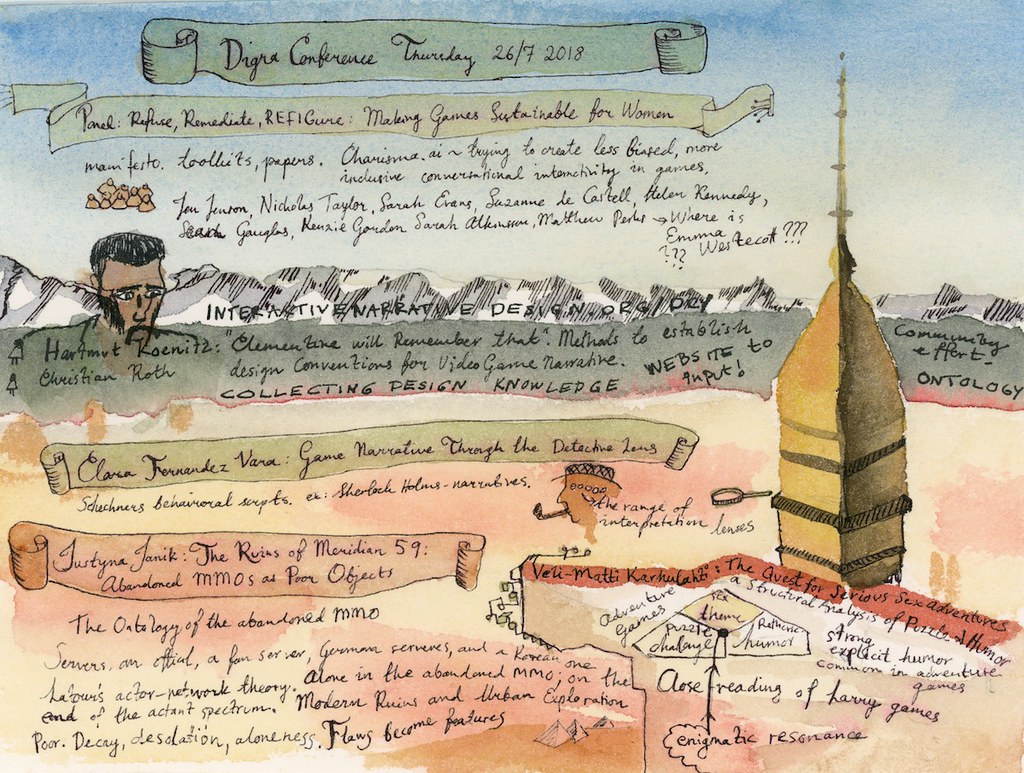
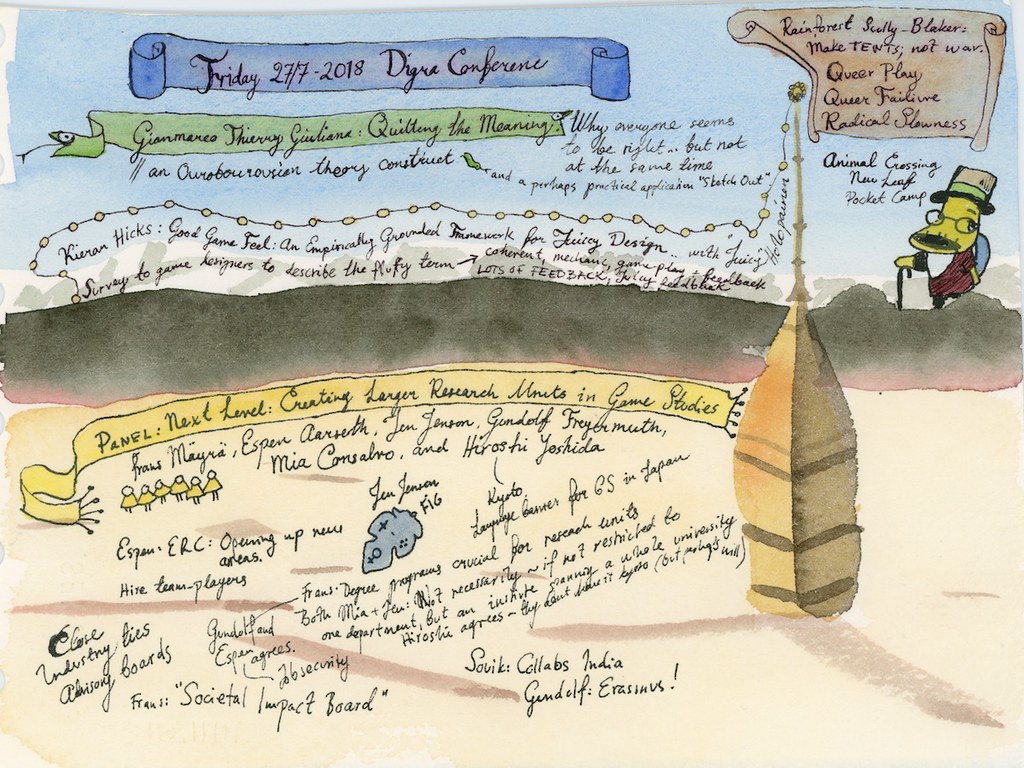
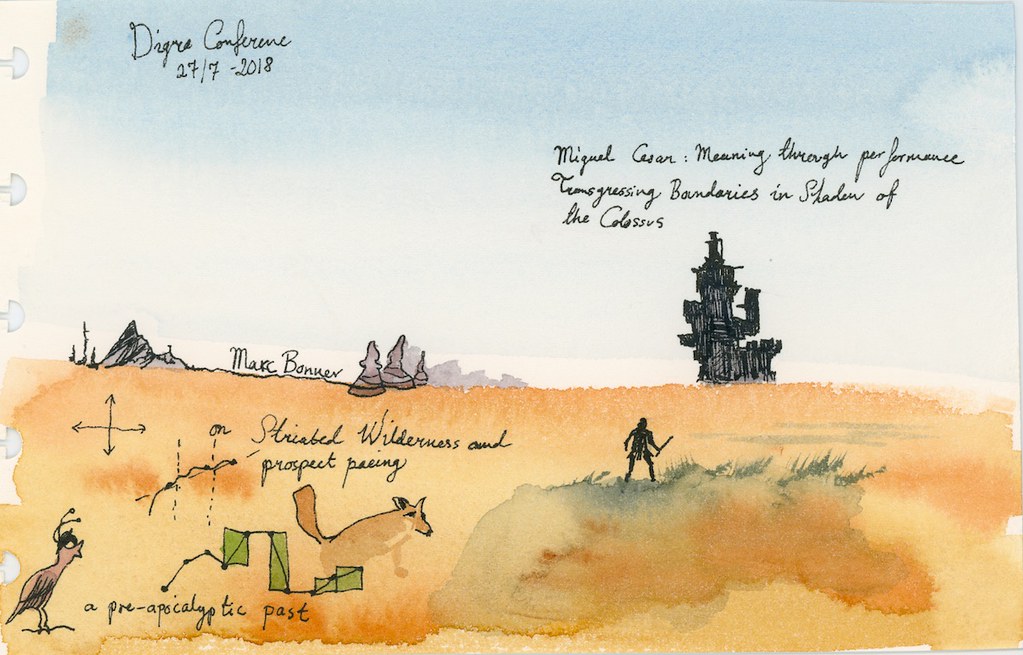
I gave a talk about how board games can be designed as safe-spaces, showing the MindShadows games, and presenting some of the design principles I have been using. The talk is up here at SlideShare, and here is a link to my paper.
Below are the watercolour notes I made.



Tuesday, July 24, 2018
Digra18 Workshop on Fun
Workshop: On Trial: FUN, by John Sharp and David Tomas,
at DiGRA 2018 in Turin, Italy.
Thomas and Sharp gave a refreshing take on the games-as-art today. “Fun” has in games a similar stigma as “beauty” has in visual arts. The made a Kantian roll-back - staring over, really examining how the notion of fun could inform an aesthetic agenda.
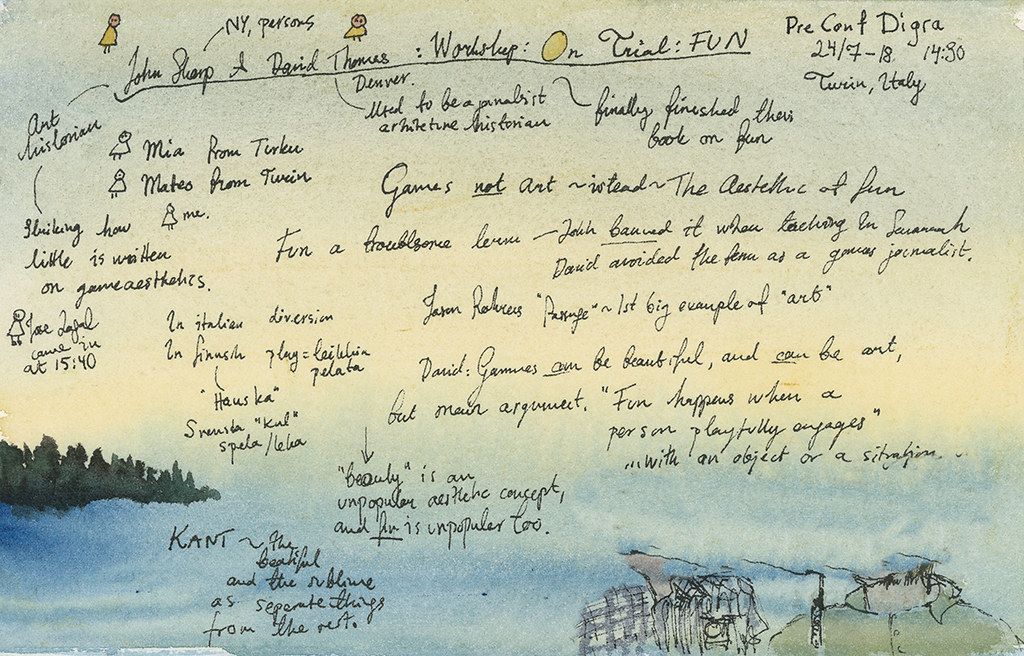
Thursday, June 07, 2018
Watercolour notes from HEVGA @ GGC18
HEVGA Symposium at Gotland Game Conference 2018 in Visby, Sweden, at Uppsala University Campus Gotland.
Here are some of my notes:
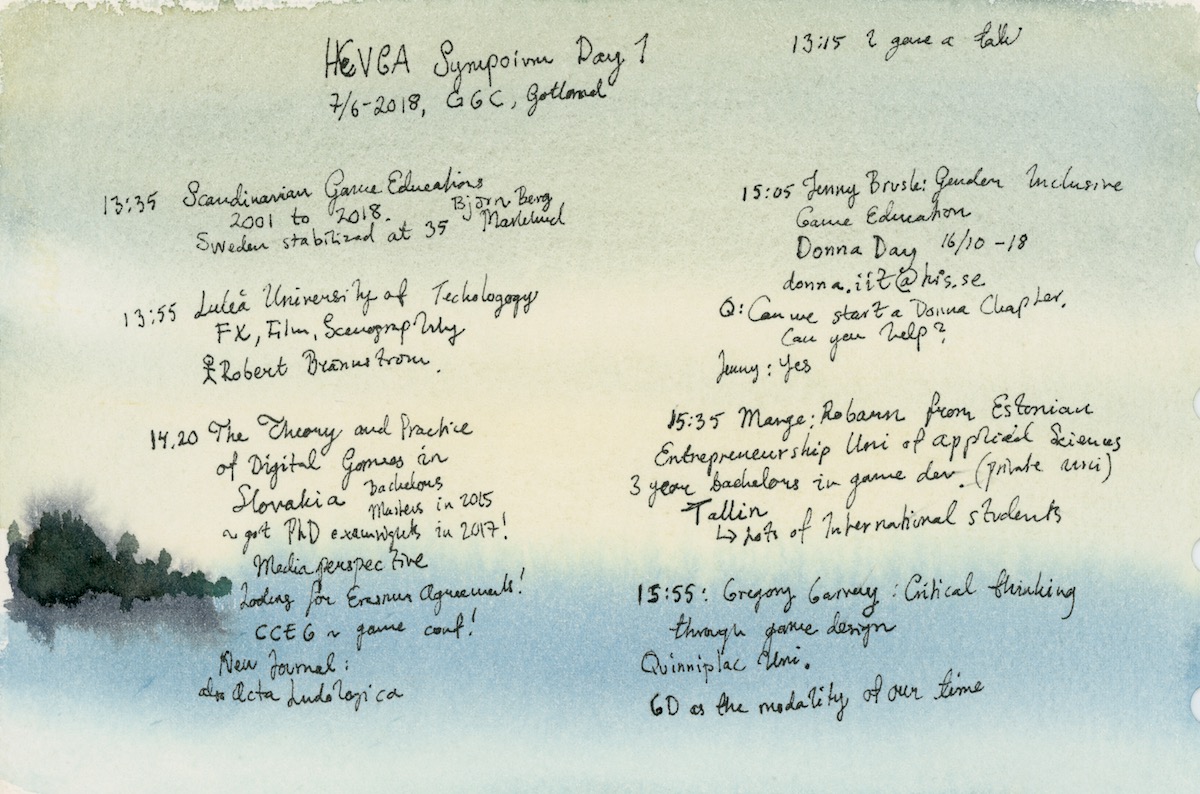
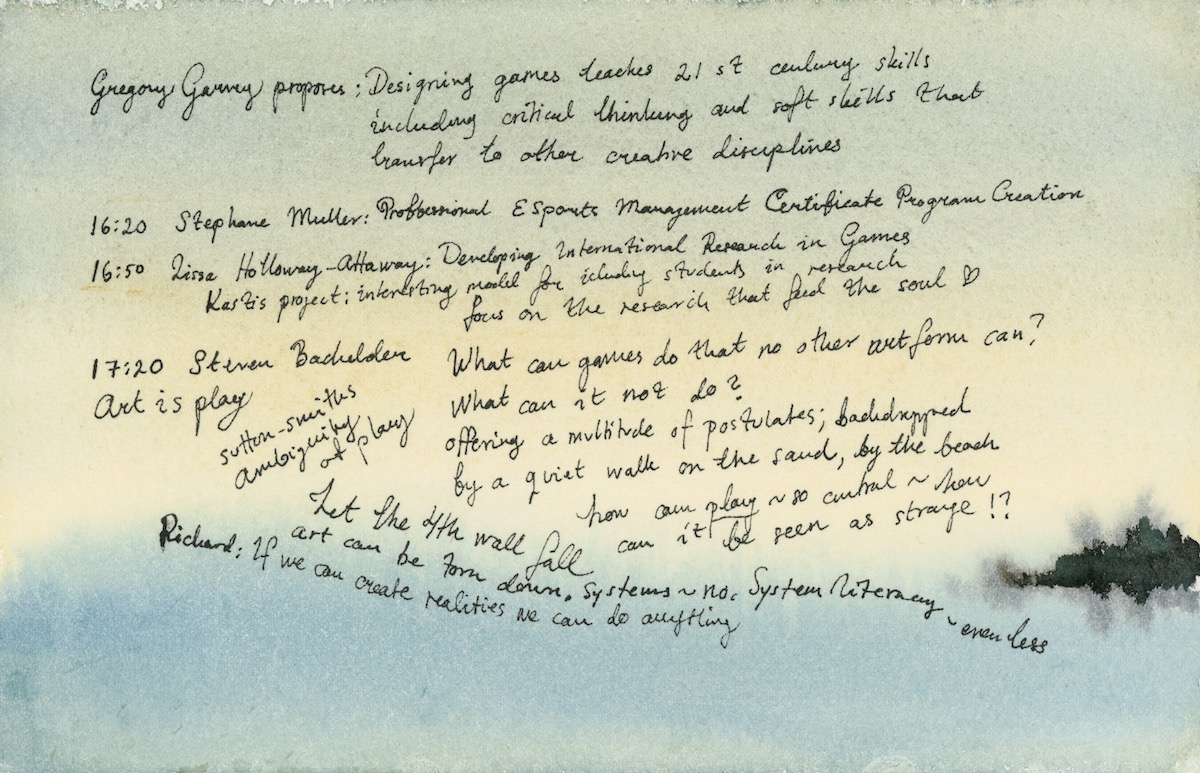
I posted a write-up of the HEVGA Symposion in the FB Group HEVGA Europe
Here are some of my notes:


I posted a write-up of the HEVGA Symposion in the FB Group HEVGA Europe
Tuesday, June 05, 2018
Wednesday, April 25, 2018
Subscribe to:
Comments (Atom)
